All the Answers
Well-known member
The Government warned that the increase for Truck Drivers is still under legal review and that 120 joint ventures have already been approved - Infobae

Source:
April 04, 2024
After Pablo Moyano's threat, the Ministry of Labor stated that the challenges from a business sector to the 25% increase for March, which exceeds the Economy guideline, are being analyzed. The presidential spokesperson said that there are “free joint ventures”
By Ricardo Carpena
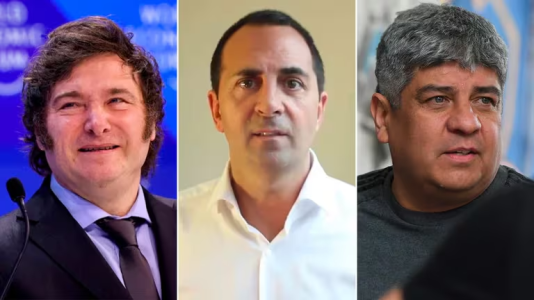
Javier Milei, Julio Cordero and Pablo Moyano
The Ministry of Labor has not yet approved the latest salary agreement of the Truckers Union and that agreement “is still under legal review” to resolve a series of challenges presented by a sector of businessmen. This was stated by official sources to Infobae, in the midst of Pablo Moyano 's threat to carry out a general strike if the support for this increase is not available on Monday.
The same sources, in addition, flatly ruled out that the Secretary of Labor, Julio Cordero, would delay the approval of salary increases that exceed the 15% guideline set by the Ministry of Economy to discourage inflationary expectations: “The Secretariat works as usual. There are already more than 100 joint agreements approved since the beginning of the year, of which almost 50 were signed by Cordero since he took office on March 14 (replacing Omar Yasín).”
“If on April 8, which is Monday, the 25% increase that was signed for March is not confirmed, not a leaf, not a pen, will move throughout the country . There is going to be a general strike from the Truckers union defending what was signed a month ago and has not yet been approved,” said Hugo Moyano's eldest son this Wednesday night, in dialogue with C5N .
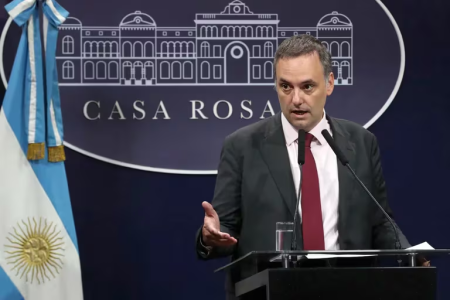
“If Pablo Moyano has the power to ensure that not a pen or a leaf moves in this country, we are wrong,” said the presidential spokesperson, Manuel Adorni.
At the Ministry of Labor they did not want to respond to Moyano and referred to the position established this morning by the presidential spokesperson, Manuel Adorni: “If he (for Moyano) has the power to ensure that not a pen or a pen moves in this country sheet we are wrong, so I guess what Pablo said was an exaggeration; We always appeal to reflection and that is why we continue trying to understand what are the reasons that put them to sleep and what are the reasons that wake them up.”
“They were asleep for so many years, with so much inflation, with so much poverty and so many workers in poor conditions, both salary and work, that it catches our attention that suddenly there are so many unemployment proposals. There was already one, announced a few days after President Milei took office, now there is another. Well, we will analyze it every time it happens and we will see if on Monday, in fact, they decide to stop. These specific issues must be discussed effectively with the Secretary of Labor, I understand that we always appeal to free joint negotiations and conversation between the parties."
The Moyano union is not alone in its claim. The national plenary session of the Confederation of Transport Workers (CATT), which deliberated last week, demanded that the Government “respect the principle of free joint ventures and not evade or postpone the homologation” of salary agreements. The next day, in a meeting with Luis Barrionuevo, the head of La Fraternidad, Omar Maturano , was more direct: “We want a CGT that is supportive, that is together with the needs of the comrades, that defends free, homeless joint ventures, and "Go to the Ministry of Labor, kick the door twice and have the increases that you could have gotten approved."
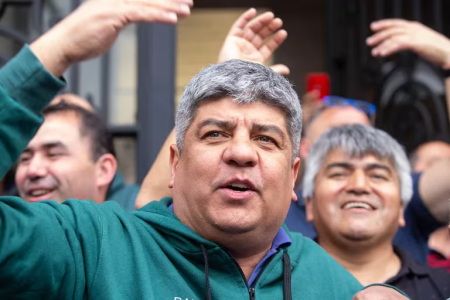
Pablo Moyano threatened with a strike by the Truckers Union starting Monday if the latest salary agreement is not approved
The Labor legal area has been analyzing for weeks the challenges to the last salary agreement that the Truckers Union agreed with the employers ( 45% in two tranches, 25% in March and 20% in April), although, in general, the increase has already It was included in March salaries, paid at the beginning of this month. Even so, without the approval, the employer sector is not obliged to pay for the improvement, much less another point included in the joint agreement: the “extraordinary contribution” to the Truckers' social work of $10,000 per worker “to solve the union's deficit.” (As there are 200,000 members, it amounts to a total of 2000 million pesos per month for the union coffers).
“The unionized companies paid the increase, so the only thing that non-approval achieves is to promote informality,” sources from the sector assured Infobae . However, there is no unanimity on the issue in business chambers. The Argentine Federation of Transport and Logistics Entities (Faetyl), chaired by Juan Domingo Aguilar, defends the salary agreement signed with the Truck Drivers Union, but in the Argentine Federation of Freight Motor Transport Business Entities (FADEEAC) resistance to endorse it.
What's more, in an internal communication, FADEEAC informed its associated companies (about 4,500 SMEs) last Wednesday that, "to date, the Ministry of Labor of the Nation has not approved the agreement (with Truckers) with which it does not what is agreed upon therein is neither enforceable nor obligatory .”
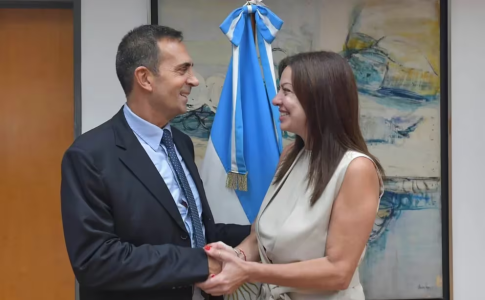
The Minister of Human Capital, Sandra Pettovello, and the Secretary of Labor, Julio Cordero
"However," he pointed out, "if any company intended to grant any adjustment or advance of salaries, in consideration of the non-approved joint venture, from our entity we consider that the best alternative would be to pay the value or percentage that they consider appropriate as an advance of salaries. and without this having any influence on contributions to social security.”
“It must be clarified that this would be a liberality of those companies that choose to do so,” warned the business entity, which added: “In the event that this is done, this advance may be compensated with the amount that will result from the equal approval in due course or against the salaries of the month of April, if even by that date the agreement had not been approved.”
The last joint union of the union led by Hugo Moyano was complicated by an internal one in the FADEEAC: four of the interior chambers (Córdoba, Santiago del Estero, Mendoza and San Juan) challenged the agreement before Labor considering that in the agreement they were incorporated " without consultation” the payment of additional payments and an extraordinary contribution for social work, whose payment “ends up favoring large companies and affects all SMEs in the country.”
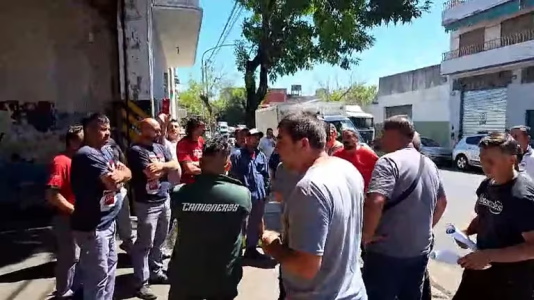
Blockade by the Truckers Union of the company Expreso Lo Bruno, whose owner did not want to sign the paritara
Federico Lo Bruno, president of the Santiago del Estero Chamber of Transportation (CATSE), said that “the joint table gave a mandate to those who are going to sign that we accepted the 20% and 25% increase in March and April, and nothing more", but he highlighted that the FADEEAC representatives who went to the official hearing "signed other points that strongly affect all companies in the interior", in reference to the payment of the "extraordinary contribution" to the Truckers' social work of $10,000 per worker.
Faced with the rejection of those chambers, the Moyano union began a strong offensive at the beginning of March against the businessmen who challenged the agreement: it declared itself in a “state of alert and permanent assemblies” due to the reluctance of the Ministry of Labor to approve the increase. salary of 45% and accused Lo Bruno and his colleagues José Arata (from CEDAC, Córdoba) and Ricardo Squartini (from APROCAM, Mendoza) of "presenting unfounded challenges trying to boycott" the approval of the salary increase by the national authorities.
On March 5, activists from the Truckers' Union attacked Lo Bruno and blocked a warehouse of his transport SME located in Villa Lugano for having challenged the increase. “We are not going to allow FADEEAC inmates to hold truck workers hostage . These exploitative businessmen and speculators are going to be responsible for the damage they cause to the workers,” the Moyano union stated in a press release.
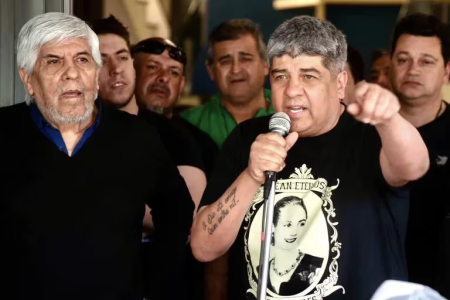
Hugo and Pablo Moyano, the heads of the Truckers Union
When the Truckers joint agreement was signed, the Secretary of Labor was Omar Yasín, who was fired on March 11 after President Javier Milei accused him of having endorsed the 48% increase in the salaries of the State's hierarchical personnel, something which caused a strong controversy amid the restrictions that the Government itself imposed on the expenses of the different official areas.
His successor, Cordero, former lawyer for Techint and the Argentine Industrial Union (UIA), as well as a member of the libertarians' labor team, inherited that dilemma of whether or not to approve the joint agreements signed by more than 15% for February, in line with what is required by the Economy Ministry. That is why since he took over his team has been dedicated to analyzing agreement by agreement to verify whether the agreed increases were granted based on an increase in productivity . In official offices they suspect that some unions forced high improvements to complicate the economic plan for the Government, beyond seeking the benefit in the pockets of the workers.
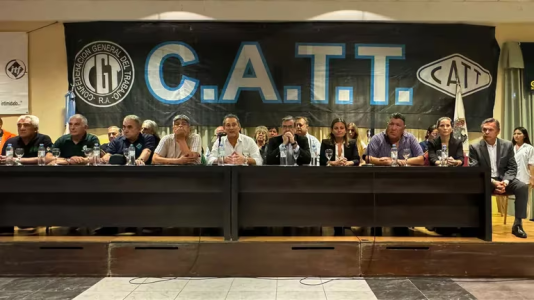
The CATT demanded that the Government “respect the principle of free joint ventures and that approval not be avoided or postponed.”
The leader of the Truckers Union, Hugo Moyano, warned last week: “An agreement has been reached with the companies, but the Government does not want to approve it. We are waiting for the deadlines established by law to go out and claim it. If necessary, we will go out to fight with whatever is necessary.” That is why there is a smell of protest in the trucking environment: the approval is blocked by FADEEAC's challenges, but what will happen if Labor gives rise to these proposals? The joint venture would have to be negotiated again, which would create a highly explosive scenario.
Although, in keeping with Pablo Moyano's threat, the conflict would detonate much earlier. Monday may be the day when the Truckers Union goes on the offensive with a national strike, in the midst of increasing union conflict and the CGT about to define its second general strike.

